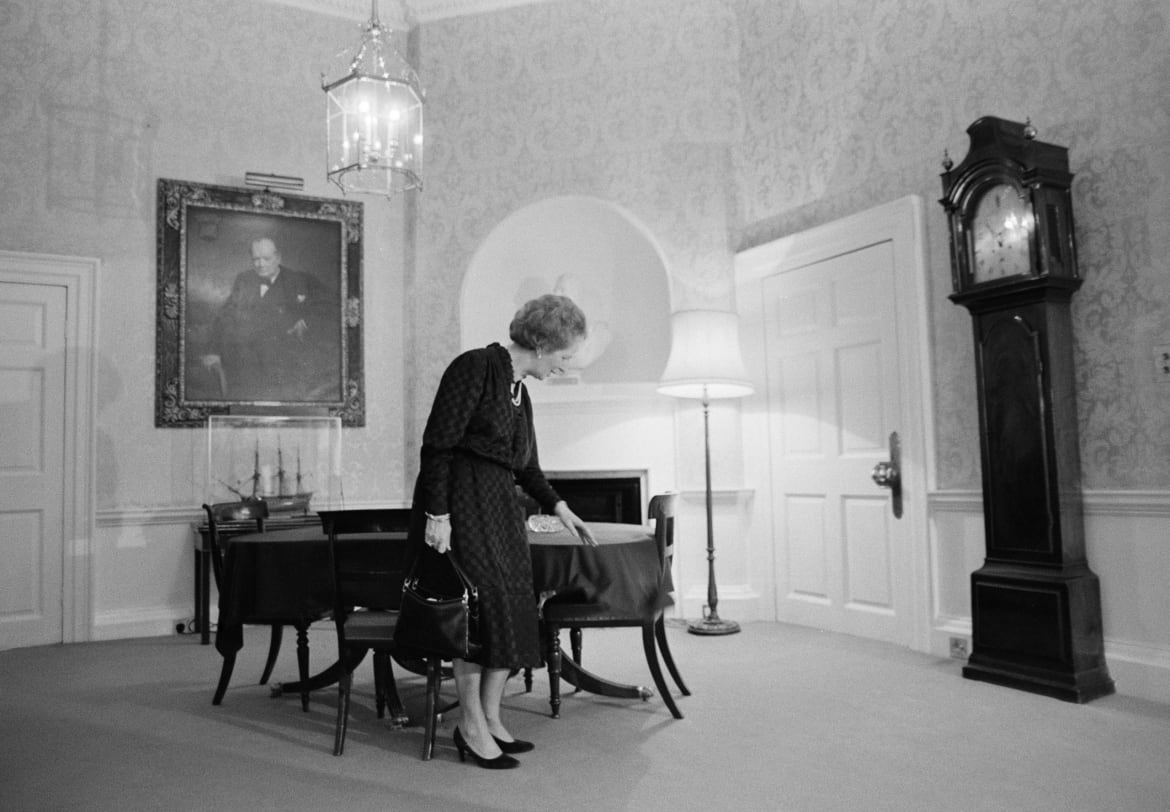Hold the gushing praise: Looming death of war monger John McCain should not be occasion to mourn says Glenn Greenwald
Appendix
A tame example of what Glenn is recommending NOT to do, this ludicrous panegyric was penned by the odious free marketeer David Frum and published on the rightwing rag The Daily Beast. The only thing Frum gets right is that the Falklands War unintentionally triggered the crash of the vicious anticommunist Argentinian military junta, supported all along till that point (but on the stealth) by the Americans and the Brits and everyone else in the usual global capitalist enforcer gang. See the excerpt below to get a taste of this disgusting brew.
IRON LADY
How Margaret Thatcher Saved Britain and Changed the World
David Frum on the legacy of Britain’s ‘Iron Lady’
Thatcher was a woman of fierce principle. Yet – and here contemporary conservatives can take another lesson from her – she lived by facts, not theories. She was among the first world leaders to recognize the reality and threat of climate change. She appreciated the devotion of her country to its National Health Service and never challenged that deeply rooted British institution. She met and mastered the challenges of her time; she bequeaths to her successors the responsibility to do the same with the very different challenges of their time.
https://www.thedailybeast.com/how-margaret-thatcher-saved-britain-and-changed-the-world
Or you can just read it on P. 2 of this post.
addendum
THE DAILY BEAST PANEGYRIC OF THATCHER THAT WE THOUGHT SHOULD NOT BE IMITATED WITH SIMILAR POLITICAL MONSTERS AND BUFFOONS.
IRON LADY
How Margaret Thatcher Saved Britain and Changed the World
David Frum on the legacy of Britain’s ‘Iron Lady’

“Me grandfather walked 50 miles in clogs to find a job in this here town, and you can’t expect me to move somewhere else now!”
That semi-apocryphal quote aptly described the Britain of the 1970s. It was a country that had succumbed to paralysis and defeatism and nostalgia. A visitor to the country then absorbed individual data points of decay: cold and dark when strikes shut down the country; friends who waited weeks for a phone line to be installed; the decay of central cities; the weird behavior of an economy where every expenditure seemed determined by whether or not it could be deducted from an 83% maximum tax rate. (“You would drink wine at lunch too,” a business friend of my father’s explained, “if the government were paying for it.”)
This is the country that Thatcher found and changed. “Get on yer bike,” said her tough employment secretary, Norman Tebbit. It took a decade of tumult and strife, but in the end: they did.
The story goes that when was Thatcher asked what was her greatest accomplishment, she smilingly answered, “Tony Blair.”
If true, the story’s meaning is this: the great politicians leave a legacy that is accepted even by their opponents. Blair accepted Thatcher’s changes to Britain’s labor laws. He accepted the end of price controls. He accepted the privatization of industry. He accepted that government spending could not rise indefinitely. He accepted the role of the entrepreneur in the modern economy. “She won the arguments that mattered,” observes her great biographer Charles Moore in an essay for Vanity Fair. This is what winning looks like: it comes when your opponents agree that you were right. (Or – more exactly – when your opponents die, and their children agree that you were right.)
The British economy lost 29.5 million workdays to strikes in 1979. In 1986, at the zenith of her strength, that figure was reduced to 1.9 million.
In 1979, the British government owned the phone monopoly. It owned the gas monopoly. It owned all electricity production and generation. It owned much of the motor car industry. It owned much of the steel industry. It owned the country’s most important airline. It owned much of the country’s housing. Mrs. Thatcher restored private ownership and management to the British economy.
She opposed British entry into the Euro. She warned that the French-German project to create a European Central Bank would create a financial monster that challenged national sovereignty and political democracy. She lost the argument for Europe, but saved Britain from the disaster.
After a decade of Western retreat, the Falklands War marked the turning of the late Cold War tide in favor of democracy against its enemies. The victory over Argentina precipitated the collapse of one of the postwar world’s most vicious dictatorships.
Thatcher convinced Ronald Reagan to do business with Mikhail Gorbachev. She prevailed on Francois Mitterrand to accept German reunification. At the crucial moment, she stiffened George HW Bush’s spine to fight to rescue Kuwait in the first Gulf War.
She was a pioneer for previously excluded minorities – and for women, no minority at all. Tom Doran reminds elsewhere on the site that Thatcher was one of the few Conservatives to vote for the decriminalization of homosexuality in 1966. She welcomed Jews into her cabinet, prompting the snide joke that she favored “Old Estonians over Old Etonians.” She promoted talent regardless of background and opened the way to an entrepreneurial Britain where acumen mattered more than accent.
Thatcher was a woman of fierce principle. Yet – and here contemporary conservatives can take another lesson from her – she lived by facts, not theories. She was among the first world leaders to recognize the reality and threat of climate change. She appreciated the devotion of her country to its National Health Service and never challenged that deeply rooted British institution. She met and mastered the challenges of her time; she bequeaths to her successors the responsibility to do the same with the very different challenges of their time.





